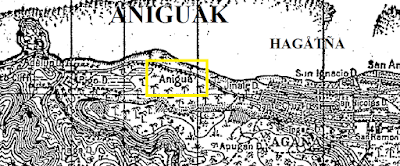But not so in the old days.
At one time, Aniguak had its own civil officials under the
Spanish government. As one can see in the map above, made around 1913, there
was actual empty space between Aniguak and Hagåtña in those days and before.
But the separation was not only legal or geographical. It
was also social.
Despite the fact that we resent being looked down on for
coming from the Marianas, many Chamorros have no problem marking other
Chamorros because they come from a different village, island and even social
class.
For Chamorros in Hagåtña, where 2/3 of the entire island
lived for a lot of the time, everyone on Guam who lived outside of the capital
city was GI SENGSONG.
GI means "at" and in this sense "from."
Sengsong is from SONGSONG, meaning "village."
Additionally, people could be called after the village or
island they were from. Someone from Luta (Rota) was called Gi Lita.
Someone from Yoña was Gi Ye'ña. From Sumay was Gi Simay. And
so on.
It's also the case that people from Hagåtña were called by
others Gi Hagåtña.
In many cases, people didn't mean any insult at all when calling someone Gi Lita or Gi Simay or what have you. But people from those places could be sensitive and be offended by being called such because, at times, it was meant as a put-down.
People from the rural villages and other islands sometimes felt judged as "lower" in status by Hagåtña people.
In 1911, we see a case where someone from the villages was
labeled such, and it was clearly meant as a put-down.
Ana and Manuel had neighboring farms in Yigo, and they would
butt heads periodically. Stray cows wandering into the other's fields, for
example. Ana was from Hagåtña, and Manuel was from Aniguåk. Even though Aniguåk
was literally a five-minute walk from the edge of Hagåtña, the social distance
was greater than several hundred yards.
In one verbal argument between the two, Ana said,
"Ai ke puñetero. På'go un gi Aniguåk yo' u na' kieto gi
lugåt-ho."
("What a nuisance. Now someone from Aniguak is going to
put me in my place.")
"Tatpalo i taotao Aniguåk."
("Aniguak people are useless.")
Manuel said in reply :
"Hågo maolek ni gi Hagåtña; po'lo ha' yo' yan i gi
Aniguåk-ho."
("You are good who are from Hagåtña; leave me be and my
being from Aniguåk.")

Have you come across a "village" name of Bilibik or Bilibic? It appears on the 1930 U.S. Census (population schedule) as part of Agana. Thanks.
ReplyDelete